- Home
- Georgette Heyer
Venetia Page 26
Venetia Read online
Page 26
He stepped back as he spoke, and the mare, needing no urging to go home to her own stable, started forward. Damerel lifted a hand in farewell, but Venetia was not looking at him, and he let it fall, and turned sharply on his heel. His eyes fell on Imber; he said in a curt, hard voice: ‘Miss Lanyon is going to London. It’s probable Mr Aubrey will come here tomorrow, to stay for some few weeks. Tell Mrs Imber to make his room ready!’
He strode away to the library, and the door shut with a snap behind him. Imber looked to see what Nidd made of this, not that he was likely to say, because he was as close as Marston, and dull as a beetle. Nidd was walking off to the stables, so there was nobody to gossip with but Mrs Imber, and she was in a bad skin, because her dough hadn’t risen, and only said: ‘Don’t come fidgeting me!’ and: ‘Get out of my way, do!’ Imber wished himself at Undershaw, to see what they made of it there, when Miss Venetia came in looking like she’d seen a ghost. Proper set about they’d be, and no wonder!
But only three people at Undershaw saw Venetia upon her return, and neither the undergroom nor the young housemaid who waited on her noticed more than her dripping habit, and the ruin of her hat, with its curled feather hanging sodden and straight beside her rain-washed face. She went up the backstairs to her room, and opened the door to find the maid there, with Nurse, and the room a welter of silver paper, and trunks, with gowns and cloaks laid out on the bed ready to be packed, the linen in which her furs had been stored all summer lying in a heap on the floor, and the sour apples which had kept the moth at bay scenting the air.
Nurse broke instantly into angry scolding, while Venetia stood on the threshold, her eyes, with that blind look in them, wandering round the disordered room. Then, quite suddenly, Nurse rounded on Jenny, driving her out of the room with orders to fetch up a can of hot water, instead of standing there like a gowk, when anyone could see Miss Venetia was soaked to the skin, and likely to catch her death. She drew Venetia to the fire, still scolding, but differently, just as years ago she had fondly scolded a little girl, appalled by some catastrophe, until she stopped crying. The little girl had known that nothing dreadful could happen to her when Nurse was there; Venetia knew now that Nurse was powerless to help her, but still was a little comforted. Nurse stripped off her wet habit, and huddled her into a dressing-gown, and made her sit by the fire, while she herself bustled about, first trotting off to mix a cordial, which she made Venetia drink, then rubbing her chilled feet, tidying the room, laying out an evening-gown, and all the time talking, talking, but never waiting for answers, and only looking at Venetia out of the corners of her sharp old eyes. Let Miss Venetia sit quiet for a while: plenty of time before she need dress again! And no sitting up late, mind, with so much as there was to do, and Mr Hendred wishful to make an early start! And no need to worry about Undershaw, either, not that she would do that for long, with all the exciting things she would be doing in London, and her aunt so kind, and new faces to see, and goodness only knew how many treats in store! It would seem strange, at first, and it stood to reason she would feel homesick, missing all the people she knew, but let her trust Nurse, and not fall into the dismals, because she would soon be better, never fear!
Venetia, understanding, tried to smile at her, and clasped her hand for a grateful moment.
‘There, my poppet! There, my dove!’ Nurse crooned, stroking her tumbled locks. ‘Don’t cry, my pretty, don’t cry!’
But it was Nurse who cried, not Venetia; and presently, seeing how calm she was, Nurse went away, hoping that she might drop off to sleep for a little while, so tired as she was.
When Nurse came back to help her to dress for dinner (for she would not let Jenny wait on Venetia tonight) she thought that she must have enjoyed a nap, for she had got a little colour back into her cheeks, and seemed more like herself, able to decide what must be packed to go to London, and what Nurse must store away in camphor and keep for her at Undershaw. She had made a list of the people she must see before she left, and the things she must attend to; and Nurse entered briskly into these matters, thinking: Anything to take her mind off, and least said soonest mended.
She had just fastened Venetia’s dress when a knock fell on the door, and was followed by Aubrey’s voice, demanding admittance. Venetia called to him to come in, but Nurse felt her stiffen under her hands, as she laid a gauze scarf over her shoulders, and said sharply, when he did come in: ‘Now, don’t come worriting Miss Venetia, Master Aubrey, for she’s tired, and has enough to think of without you adding to it!’
‘I want to speak to you before you come downstairs,’ he said, paying no heed to Nurse.
Venetia’s heart sank, for she knew by the look in his face that he was going to be difficult. She said, however: ‘Yes, love, to be sure! Did you have good sport? Were you caught in the rain? I was! Thank you, Nurse! I shall do now: no one ever dresses my hair as well as you! Oh, Aubrey, my head is in such a whirl! I feel quite distracted, and can hardly believe it is true, and I am really going to London at last!’
She sat down at her dressing-table, so that she was not obliged to look at him, and began to select from her trinket-box the ornaments she wished to wear. As Nurse shut the door, he said: ‘You mean to go, then?’
‘Yes, how can you ask me? It is exactly what will suit me best, and you, too.’
‘It won’t suit me to stay with Aunt Hendred, if that’s what you’re thinking.’
‘No, not that, although – Have you seen my uncle?’
‘Oh, yes, I’ve seen him! I told him I shouldn’t go, unless you particularly wished for me.’
‘Aubrey, you weren’t uncivil?’ she exclaimed.
‘No, no!’ he answered impatiently. ‘I said what was proper, of course! I told him that Appersett having been away I was got behindhand, and must apply. He understood. At any rate, he didn’t care. My aunt would as lief I didn’t go, I know. That don’t signify! But he said you had told him of your scheme to set up house – wished me to promise I wouldn’t encourage you, since it wouldn’t do!’
‘My dear, I hope you did no such thing! It’s quite nonsensical! That’s why I am so glad that this chance has come in my way. I had made up my mind to it that there can be no staying at Undershaw while Mrs Scorrier remains fixed, and how can I find a house that will suit us unless I go to town? Do you dislike it? I won’t drag you away from Mr Appersett, if you do, but when you have gone up to Cambridge, there will be the vacations, and –’
‘That’s not it!’ he interrupted. ‘There must be tutors to spare in London, or I could study alone. What I don’t understand – Venetia does Jasper know of this?’
‘Yes, I rode over to tell him – thinking that very likely you wouldn’t care to go to Cavendish Square, and wishing to be sure that –’
‘What did he say to it?’ Aubrey demanded, frowning.
‘Need you ask? He said instantly that he would be glad to have you, and for as long as you choose to say. Oh, and I was to tell you to bring your horses, and the dogs, and that reminds me, love, if you do that you must take Fingle as well. And make him understand that Nidd is head groom at the Priory: you know what he is!’
‘Oh, for God’s sake – !’ he broke in irritably. ‘I’ll take care of all that! Is Jasper willing you should go? I thought – Venetia, are you going to marry him?’
‘Good gracious, no! Oh, you are thinking of a silly talk we had once! I wish you will forget it, for I fancy I shall never marry anyone. I thought at one time I might marry Edward; then I wondered if Damerel might not suit me better; and now – well, now I can’t think of anything but London, so it’s plain I am a hopeless case!’
‘I thought you were in love – both of you.’
‘Only flirting, stoopid!’
He stood looking at her for a minute. ‘Well, I still think it. I daresay I don’t notice a great deal, but I know when you’re shamming it!’
‘But, Aubrey, indeed
–’
‘Oh, hold your tongue!’ he snapped, his temper flaring up. ‘If you don’t choose to tell me, it’s all one to me, but stop pitching that gammon! I don’t mean to meddle: I detest meddlers!’
‘Don’t be vexed with me! Pray don’t!’ she managed to say.
He had limped to the door, but he paused, and looked back. ‘I’m not vexed. Not with you – at least, I don’t think so: I suppose you must know what you’re about. Only I hoped you would have settled it between you. I like Jasper. Oh, well!’ He pulled open the door, and went away, banishing her, she thought, from his mind.
Sixteen
Three days later Venetia awoke, after a disturbed night, to the sound of a strident voice monotonously adjuring the residents in Cavendish Square to buy good silver-sand for their kitchens. Mrs Hendred, installing her niece in the best spare bedchamber, overlooking the Square, had told her that she would find it wonderfully quiet, quite unlike rooms that looked on to a street. It was certainly quieter than the room Venetia had occupied in Newark, on the previous night, but to one accustomed to the stillness of the country it more nearly resembled pandemonium than the quiet situation of the house-agents’ advertisements. It seemed as though no one ever went to bed in London; and whenever, during a lull in the apparently endless flow of traffic, she dropped off to sleep, she was very soon jerked awake by the voice of the watchman, proclaiming the hour, and the state of the weather. She could only suppose that the ears of Londoners had been bludgeoned into insensitivity and trust that her own would soon grow accustomed to the ceaseless racket; and, being a well-mannered girl, presently assured her aunt that she had passed an excellent night, and was feeling perfectly restored from the effects of her journey.
Her heavy eyes belied her. She had, in fact, enjoyed little sleep during any of the past three nights; and, since she was wholly unused to travel, a journey of nearly two hundred miles had left her battered, exhausted, and unable to believe, when she lay in bed, that she was not still being rocked and jolted down an endless post-road.
The expedition, once so longed-for, would live in her memory, she thought, only as a nightmare. At the start all had been bustle and distraction, with Powick to be interviewed, hurried arrangements to be made, keys, accounts, and memoranda to be handed over, warning reminders to be delivered; and a letter to be written to Lady Denny. Worst of all had been the leave-takings, for Nurse and Mrs Gurnard and Ribble had wept, and had had to be comforted; and when, with her uncle standing by with his watch in his hand, she came to the final moment of parting with Aubrey she was so much overpowered that she dared not trust her voice, and could only hug him convulsively, unable to see his face for the tears that filled her eyes.
There had been no time for private reflection until she had left York, where an hour had had to be spent with Mr Mytchett; but when she had signed the last of the documents spread before her, and answered the last of the careful questions put to her, there was too much. Mr Hendred, resigning himself to an inevitable recurrence of his nervous tic, wrapped a shawl about his head, and leaned back in his corner of the chaise, resolutely closing his eyes; and his niece was consequently at leisure to indulge reflection. Her thoughts were not happy; unfortunately they were absorbing, so that instead of gazing eagerly upon an unknown countryside, and watching for landmarks of note, she looked at little but the bobbing forms of the postilions, and took only a faint interest in the various historic towns through which she passed. The first stage of the journey had been necessarily short, leaving a hundred and twenty miles still to be covered. She had acquiesced in her uncle’s decision to halt but one night on the road; but when at last the chaise drew up in Cavendish Square she was so tired that she could reply to her aunt’s solicitudes only with mechanical civility, and force herself to swallow no more than a few mouthfuls of the elegant supper provided for her refreshment. Nothing could have exceeded Mrs Hendred’s kindness, or the expressions of warm affection with which she greeted the niece she had not seen for seven years. She fondled her, and pressed every attention upon her, herself escorted her to her bedchamber, stayed while her dresser waited upon Venetia, and did not leave the room until she had tucked Venetia into bed with her own hands, kissing her, and murmuring into her ear promises of much cosseting, and innumerable treats.
Mrs Hendred was a very pretty woman of great good-nature and much less than commonsense. Her chief objects in life were to remain in the forefront of fashion, and to achieve advantageous marriages for her five daughters within the shortest possible time of having expensively launched each of these damsels, one after the other, into society. She had achieved an excellent match for Louisa that very year; and hoped to do no less well for Theresa in the following spring, provided that the treatment she was at present undergoing at the hands of the dentist proved successful, and she was not obliged to have three front teeth extracted, and false ones screwed to their stumps; and provided also that before the date of her presentation a husband could be found for her beautiful cousin. Theresa was a pretty girl, and would have a handsome portion, but Mrs Hendred was under no illusion: Venetia might be handicapped by her five-and-twenty years, but she was not only so beautiful that people turned their heads in the street to stare at her, but she had more charm than all the Hendred girls put together. There were certain difficulties attached to the task of marrying her suitably, of which Mrs Hendred was only too well aware, but that good lady’s optimism encouraged her to hope that with the assets of beauty, charm, and a considerable independence she might be able to contrive a very respectable alliance for her. But she did think it a sad pity that Venetia had not accepted Edward Yardley’s offer, for it would have been just the thing for her, since Mr Yardley was a warm man, and had enjoyed her father’s favour. Sir Francis, in writing, years ago, to decline his sister’s offer to present Venetia, had informed her that Venetia’s marriage was as good as settled. It was not long before she had told Venetia of this circumstance, and great was her shocked dismay when she learned that so far from entertaining any notion of marriage Venetia had come to town with the fixed resolve of establishing herself and Aubrey in a house in a quiet part of the town, or even, perhaps, in the suburbs. She could not have been more aghast had Venetia announced her intention of entering a nunnery, and most earnestly did she beg her to banish all such schemes from her head. ‘Your uncle would never hear of it!’ she said.
Venetia, who found her almost invariably comical, could not help laughing, but said affectionately: ‘Dear ma’am, I would not, for the world, distress you, but I’m of full age, you know, and I’m afraid it is not in my uncle’s power to prevent me!’
The most that could be got from her was a half-promise not to think any more about houses and chaperons until she had had time to grow accustomed to town life and customs. It would be churlish to make plans to leave her aunt’s house almost as soon as she entered it, she thought: as churlish as it would be to betray how little she cared for the delightful schemes made for her entertainment. Mrs Hendred, to whom country life was abhorrent, was so determined to make up to Venetia for the years she had spent in Yorkshire, and so sincerely anxious to do everything that might be supposed to give her pleasure, that gratitude as well as good manners made it impossible for Venetia even to hint to her that she longed only to be quiet, and alone. The least she could do, she felt, was to smile, and to appear at least to be happy.
She soon discovered that ease and enjoyment ranked only second in Mrs Hendred’s creed to fashion. Knowing her to be the mother of a numerous progeny, Venetia had supposed that she would have been continually busy with maternal cares, and was at first astonished to find that anyone so overflowing with soft affection should be content to surrender her children to governesses and nursemaids. When she became better acquainted with her she was amused to perceive that although Mrs Hendred had a kinder heart she was, in her own way, quite as selfish as had been her eccentric brother. While holding the members of her family and a larg
e circle of friends in easy affection, her deepest feeling was reserved to herself. She was naturally indolent, so that half-an-hour spent amongst her children was as much as she could support without becoming exhausted by their chatter. Even Theresa, on the verge of coming-out, only appeared in the drawing-room, with her next sister, after dinner, when no company was being entertained, for Mrs Hendred believed that there were few things more tiresome than households where girls not yet out were permitted to mingle with the guests. As for her three sons, the eldest was at Oxford, the second at Eton, and the youngest in the nursery.
Mr Hendred, his ill-health notwithstanding, was seldom in Cavendish Square for many days together, but seemed to spend a large part of his time in posting about the country on errands either of private or of public business. It did not appear to Venetia that he took much part in the rearing of his offspring or in the management of his household, but he was held in great respect by everyone, his few commands being instantly and unquestioningly obeyed, and any of his reported utterances being accepted as clinchers to every dispute. Upon installing Venetia in his house, and telling her that she was to apply to him for such sums of money as she required, he left her to his wife to entertain, confining his attentions to the expression every now and then of his hope that she was enjoying herself.
To a certain extent she was enjoying herself. It would have been impossible for her not to have been diverted and interested on the occasion of her first visit to London, where everything was new to her, and so much was wonderful. Her aunt might wish that she could have taken her to the Opera, and to Almack’s, and say a dozen times in a week, ‘If you had only been here during the season – !’ but country-bred Venetia was in a puzzle to know how any more amusements could be squeezed into days already crammed with engagements. London was rather thin of company, but enough members of the haut ton, who shared Mrs Hendred’s opinion of country life, had flocked back to the metropolis at the beginning of October to constitute what to Venetia was a crowd; and a very respectable number of gilt-edged invitation-cards had been delivered in Cavendish Square. Even the shabbiest play was a treat to one who had never before been inside a theatre; a drive in Hyde Park could hardly be accomplished without Mrs Hendred’s pointing out to her some notable figure; and a walk down Bond Street, the most fashionable lounge in town, was fraught with interest and amusement, since while on the one hand one encountered there Pinks of astonishing elegance, there were also surely the finest shops in the world to be gazed at. Nor was Venetia’s mind so elevated as to disdain fashion: she was possessed of natural good taste, and the dresses she brought with her from Yorkshire quite relieved Mrs Hendred’s mind of its fear that she might be a dowd, and had even drawn from her dresser a few words of rare praise; but she was perfectly ready to add to her wardrobe, and, indeed, took a good deal of pleasure in rigging herself out in the first stare of the mode. In her aunt’s company, too, she found endless amusement, for, having lived with selfish persons all her life, she was not in the least alienated by Mrs Hendred’s determination to let nothing interfere with her own comfort, but continued to think her comical, and to like her very well. But under her enjoyment there was a dull ache of unhappiness, never forgotten, and sometimes turning to acute anguish. She could not banish Damerel from her mind, or cease from thinking, involuntarily, of what she would tell him about St Paul’s Cathedral, or how he would laugh when he heard of Mrs Hendred’s conviction that by causing a plate of hard biscuits to be set at her elbow at every meal, while she partook of such delectable dishes as truffle pie and lobster patties, she was adhering to a strict and a reducing diet. Even as the mischievous smile quivered on her lips the recollection that she would never share a joke with him again, perhaps never see him again, would sweep over her, plunging her into such despair that she understood why people like poor Sir Samuel Romilly committed suicide, and envied them their escape from hopelessness. She lived for Aubrey’s infrequent letters, but they brought her little comfort. He was a poor correspondent; and such news as he sent her was mostly concerned with Undershaw. When he mentioned Damerel it was only to say that he had been out shooting with him, or had beaten him three times in succession at chess.

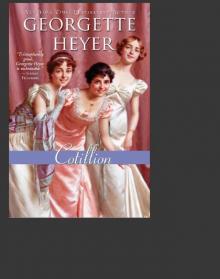 Cotillion
Cotillion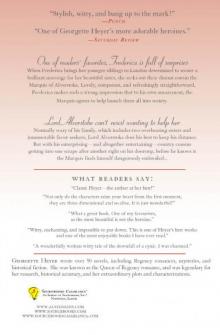 Frederica
Frederica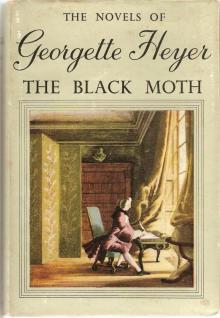 The Black Moth: A Romance of the XVIIIth Century
The Black Moth: A Romance of the XVIIIth Century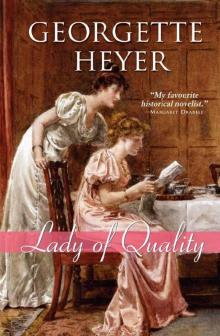 Lady of Quality
Lady of Quality Snowdrift and Other Stories
Snowdrift and Other Stories An Infamous Army
An Infamous Army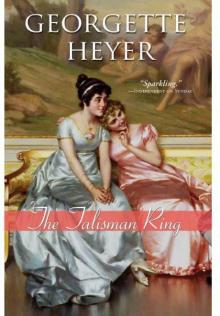 The Talisman Ring
The Talisman Ring Venetia
Venetia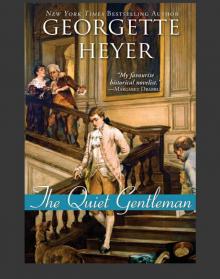 The Quiet Gentleman
The Quiet Gentleman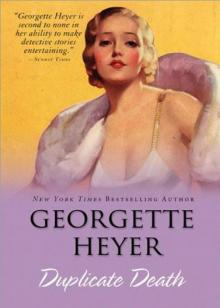 Duplicate Death
Duplicate Death Cousin Kate
Cousin Kate Black Sheep
Black Sheep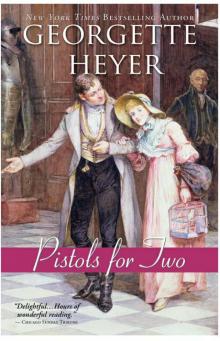 Pistols for Two
Pistols for Two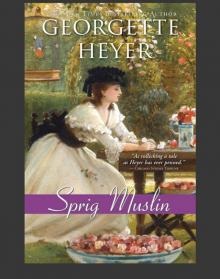 Sprig Muslin
Sprig Muslin No Wind of Blame
No Wind of Blame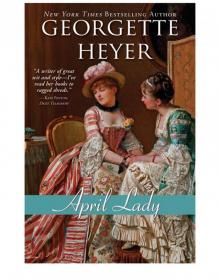 April Lady
April Lady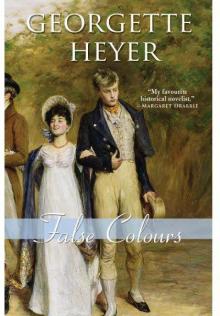 False Colours
False Colours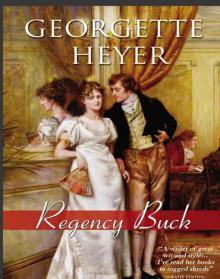 Regency Buck
Regency Buck The Toll-Gate
The Toll-Gate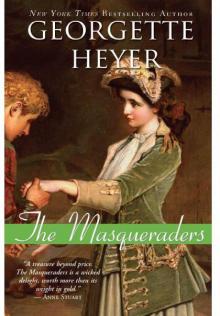 The Masqueraders
The Masqueraders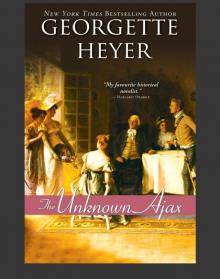 The Unknown Ajax
The Unknown Ajax The Grand Sophy
The Grand Sophy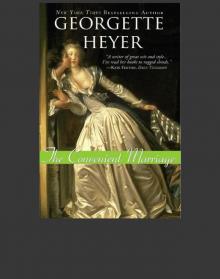 The Convenient Marriage
The Convenient Marriage Faro's Daughter
Faro's Daughter The Conqueror
The Conqueror The Foundling
The Foundling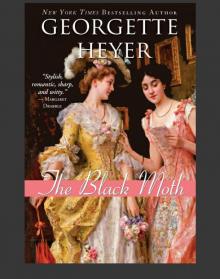 The Black Moth
The Black Moth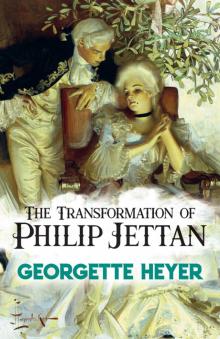 The Transformation of Philip Jettan
The Transformation of Philip Jettan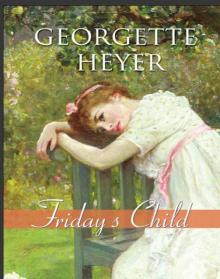 Friday's Child
Friday's Child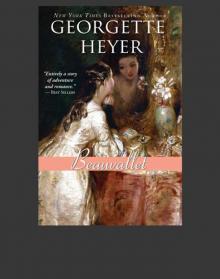 Beauvallet
Beauvallet They Found Him Dead
They Found Him Dead Charity Girl
Charity Girl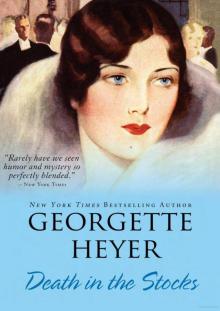 Death in the Stocks: Merely Murder
Death in the Stocks: Merely Murder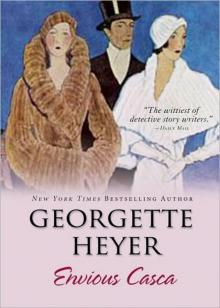 Envious Casca
Envious Casca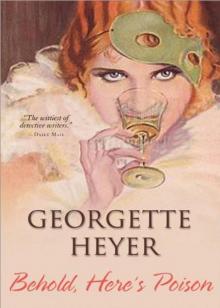 Behold, Here's Poison
Behold, Here's Poison Arabella
Arabella The Nonesuch
The Nonesuch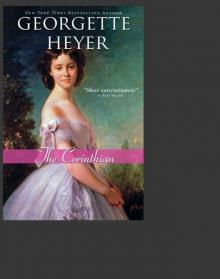 The Corinthian
The Corinthian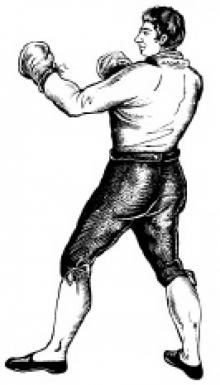 Jennifer Kloester
Jennifer Kloester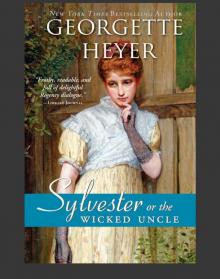 Sylvester
Sylvester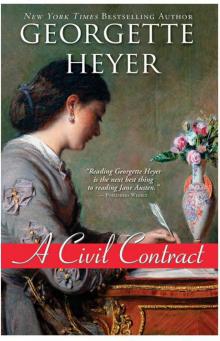 A Civil Contract
A Civil Contract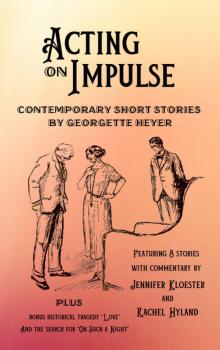 Acting on Impulse
Acting on Impulse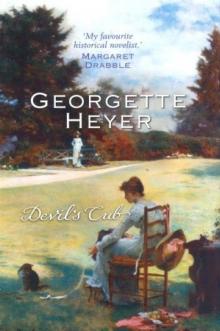 Devil’s Cub at-2
Devil’s Cub at-2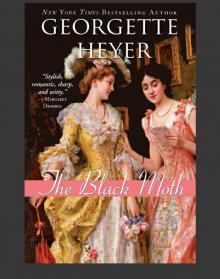 Black Moth
Black Moth Grand Sophy
Grand Sophy Instead of the Thorn
Instead of the Thorn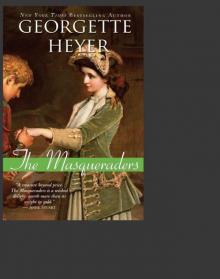 Masqueraders
Masqueraders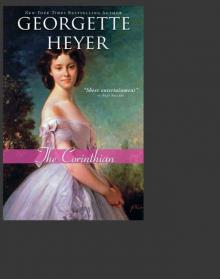 Corinthian
Corinthian Reluctant Widow
Reluctant Widow